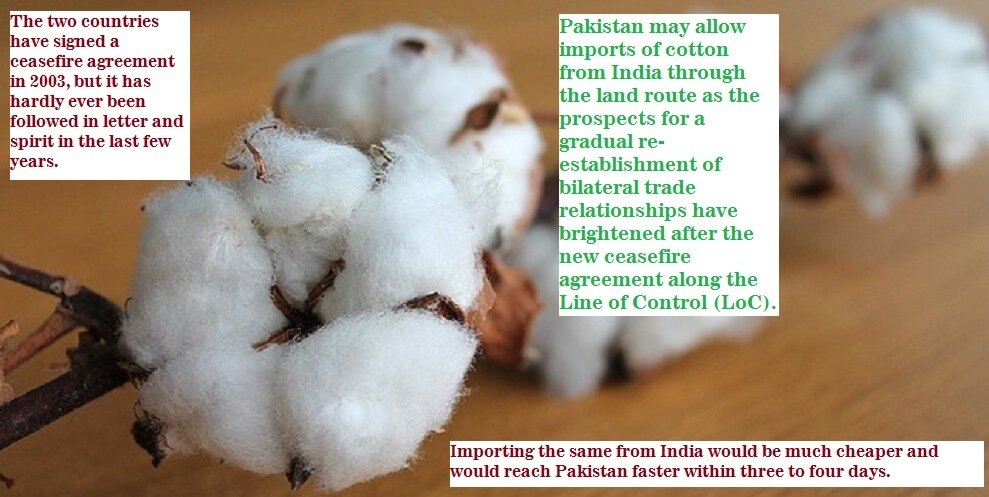Pakistan may allow imports of cotton from India through the land route as the prospects for a gradual re-establishment of bilateral trade relationships have brightened after the new ceasefire agreement along the Line of Control (LoC) as per the media report on Sunday.
Citing a source in the Ministry of Commerce, Pakistan based daily English-language newspaper, The Express Tribune reported that Adviser to the Prime Minister of Commerce Abdul Razak Dawood may decide whether one should import cotton and cotton thread (yarn) from India coming weeks.
They said that the issue of cotton shortfall had already been brought to the attention of Prime Minister Imran Khan, who also holds the portfolio of the Minister of Trade. Once a principled decision has been made, a formal order will be addressed to the Economic Coordination Committee of the Cabinet the sources reported.
Sources further said that in-house discussions had already begun, but the final decision would be taken only after the approval of the Prime Minister had been sought.
Also Read: India’s export prospects brightened dairy products in global market
‘I cannot say yes or no at this stage and would be in a better position to respond on Monday,’ Dawood told that, answering a question as to whether Pakistan was considering allowing the import of cotton from India.
According to the daily reports, ‘trade ties between the two countries can help to minimise production costs in Pakistan and ensure a sustainable supply of food’.
Both India and Pakistan have issued a joint statement on Thursday to strictly observe all ceasefire agreements in the LoC and other sectors following the hotline discussions of their Directors-General for Military Operations.
The two countries have signed a ceasefire agreement in 2003, but it has hardly ever been followed in letter and spirit in the last few years.
Relationship between the two neighbourhood have deepened following a series of terrorist attacks in India by Pakistan-based terrorist groups.
Bilateral ties worsened further after India revoked the special status of Jammu and Kashmir in 2019. This bold step angered Pakistan, which downgraded diplomatic relations and expelled the High Commissioner of India from Islamabad. Pakistan has also broken all air and road links with India and suspended trade and rail line services.
The source added that compared to the estimated annual consumption of a minimum of 12 million bales, the Ministry of National Food Security and Research anticipates only 7.7 million bales to be produced this year. However, the lowest production estimates for cotton ginners for this year are only 5.5 million bales.
There is a minimum shortage of six million bales, and Pakistan has so far imported approximately 688,305 metric tonnes of cotton and yarn, costing $ 1.1 billion, as per the Pakistan Bureau of Statistics. There is still a disparity of around 3.5 million bales that needs to be filled through imports.
Due to the insufficiency of cotton and yarn, Cotton industry workers were forced to import them from other countries like, United States, Brazil and Uzbekistan. Importing the same from India would be much cheaper and would reach Pakistan faster within three to four days.
Importing yarn from countries other than India was not only costly, but would also take minimum one to two months to reach Pakistan, mentioned daily, citing businessmen dealing with these commodities.
Delays in yarn import may pose a risk of timely delivery of export orders, according to the paper. However, the All Pakistan Textile Mills Association (APTMA) is putting pressure on the government of Pakistan for not to allow imports of cotton and yarn from India.
The industry insider told the daily that few millers had already hoarded cotton and were now charging higher rates, and that imports would dampen their short-term income.
Also Read: 54 FPOs and 15 top agribusiness entities come together for Samvad for Safalta discussion
In an appeal to Dawood, APTMA said that imports of yarn from India would have a direct impact on the price of cotton throughout Pakistan.
‘The cotton sowing season is presently starting in Pakistan and the presumed fall in cotton prices due to imports from India is about 10-15%, which discourages farmers from sowing cotton,’ said APTMA. On Thursday, India stated that it wants normal neighbourly relations with Pakistan and is committed to resolving all issues bilaterally in a peaceful manner.
Prime Minister Imran khan welcomed the ceasefire agreement with India on Saturday and said that Islamabad remains ready to move forward to resolve “all outstanding issues” through diplomatic dialogue.


















Add Comment